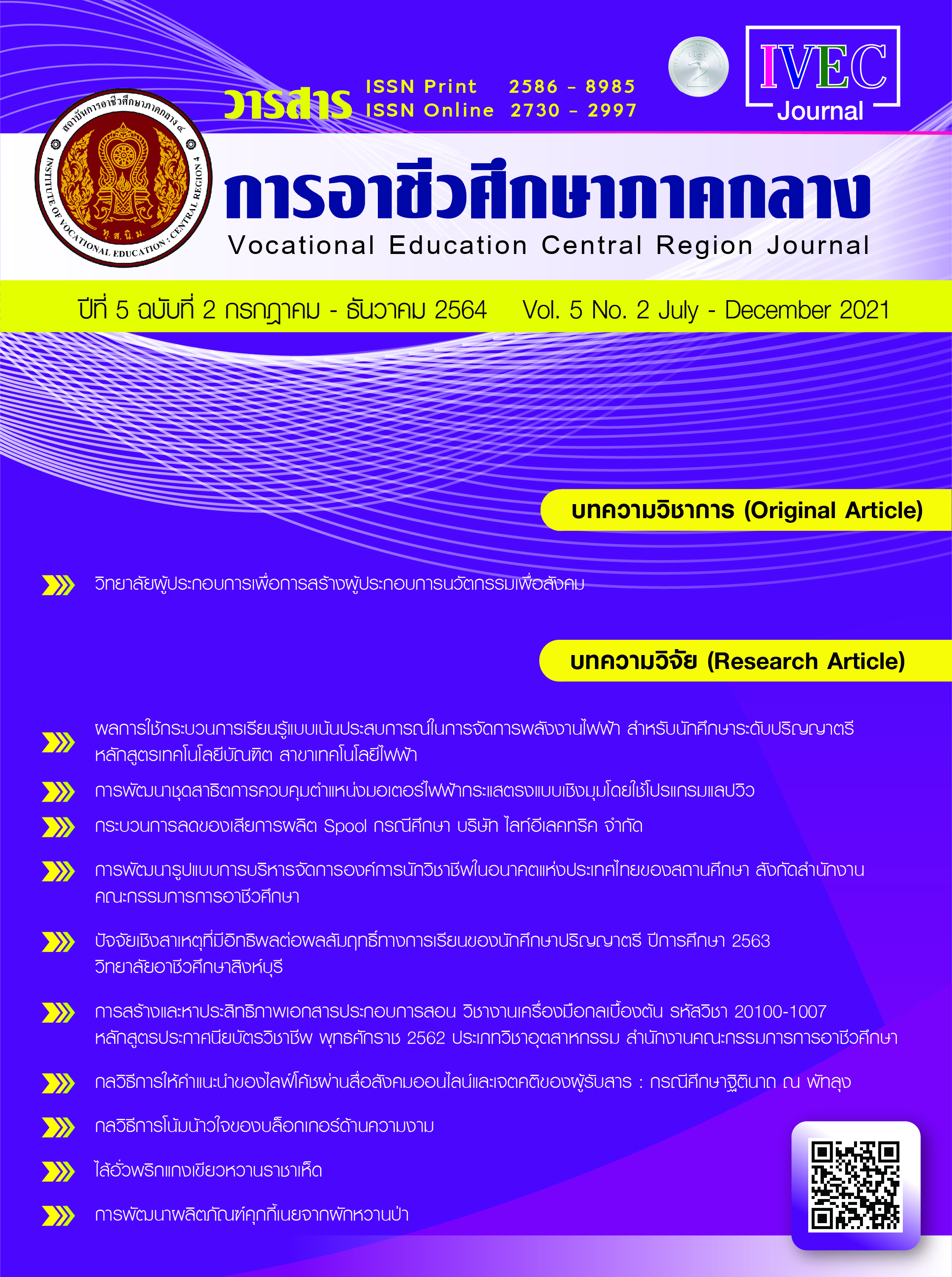Results for using experiential learning Process of Electric Power Management for Students Bachelor of Technology Program, Electrical Technology Department
Main Article Content
Abstract
This research aims to 1) Compare the learning achievement before and after learning by using the experiential learning process 2) Compare the learning achievement after using the experiential learning process with 70 percent criteria and 3) Study the students' satisfaction learning by using the experiential learning process. The sample used in this research was 17 first year students of the Bachelor of Technology Program Electrical Technology Department NakhonPathom Technical College, Institute of Vocational Education: Central Region 4, 2 semesters, 2 academic year 2019, were obtained by purposive sampling which studied in the course of electrical energy management. The research instruments consisted of 4 experiential learning lesson plans, achievement tests and achievement tests total of 40 items, with a difficulty between 0.31 - 0.75, the discrimination level is between 0.25 - 0.73, and reliability level at 0.89 and the student satisfaction assessment form using the experiential learning process consisting of 12 items, the reliability level at 0.91. The data were analyzed by percentage, means, standard deviation and t - test dependent sample group and t - test one sample group. The research results were found that 1) The Student’s achievement after learning by using the experience learning process was significant higher than that before at 0.01 level. 2) The Student’s achievement by using the experience learning process was significant higher than the criteria of 70 percent at 0.01 level and 3) The Student’s indicated their overall satisfaction toward learning by using the experience learning process overall at the highest level.
Article Details

This work is licensed under a Creative Commons Attribution-NonCommercial-NoDerivatives 4.0 International License.
|
บทความ ข้อมูล เนื้อหา รูปภาพ ฯลฯ ที่ได้รับการตีพิมพ์ในวารสาร การอาชีวศึกษาภาคกลาง ถือเป็นลิขสิทธิ์ของวารสารการอาชีวศึกษาภาคกลางหากบุคคลหรือหน่วยงานใดต้องการนำทั้งหมดหรือส่วนใดส่วนหนึ่ง ไปเผยแพร่ต่อหรือเพื่อกระทำการใด ๆ กองบรรณาธิการไม่สงวนสิทธิ์ ในการคัดลอกบทความเพื่อการศึกษาแต่ให้อ้างอิงแหล่งที่มาให้ครบถ้วน สมบูรณ์ สงวนสิทธิ์ โดย สถาบันการอาชีวศึกษาภาคกลาง 4 ที่ตั้ง 90 ถนนเทศา ตำบลพระปฐมเจดีย์ อำเภอเมือง จังหวัดนครปฐม โทรศัพท์ 034 242 856 , โทรสาร 034 242 858 ISSN : 3056-9176 (print) ISSN : 2985-2382 (online) |
References
กรมพัฒนาพลังงานทดแทนและอนุรักษ์พลังงาน. (2556). คู่มือการบริหารจัดการพลังงานไฟฟ้า. กรุงเทพฯ: กระทรวงพลังงาน กรมพัฒนาพลังงานทดแทนและอนุรักษ์พลังงาน.
จตุพร ผ่องลุนหิต และคณะ. (2561, มกราคม-เมษายน). ผลของการจัดการเรียนรู้เชิงประสบการณ์ที่มีต่อทักษะการแก้ปัญหาและทักษะการเชื่อมโยงทางคณิตศาสตร์ ของนักเรียนชั้นมัธยมศึกษาปีที่ 3. วารสารวิชาการหลักสูตรและการสอน มหาวิทยาลัยราชภัฏสกลนคร, 10, (27), หน้า 15 - 26.
ทิศนา แขมมณี. (2556). ศาสตร์การสอน องค์ความรู้เพื่อการจัดกระบวนการเรียนรู้ที่มีประสิทธิภาพ (พิมพ์ครั้งที่ 17). กรุงเทพฯ: สำนักพิมพ์แห่งจุฬาลงกรณ์มหาวิทยาลัย.
นงนุช เสือพูมี, วัลทณี นาคศรีสังข์ และประไพพิศ สิงหเสม. (2560). การจัดการเรียนรู้แบบประสบการณ์ทางการพยาบาล. วารสาร
พยาบาลกระทรวงสาธารณสุข, 27, (1), หน้า 12 - 21.
พิชิต ฤทธิ์จรูญ. (2556). ปฏิบัติการวิจัยในชั้นเรียนครูทุกคนทำได้ไม่ยาก. กรุงเทพฯ: เฮ้าส์ ออฟ เคอร์มิสท์.
พุ่มพฤกษ์ กำสมุทร และคณะ. (2661, มกราคม – เมษายน). การประยุกต์ใช้กระบวนการเรียนรู้จากประสบการณ์ สาระการเรียนรู้คณิตศาสตร์ เรื่อง การบวก การลบ ชั้นประถมศึกษาปีที่ 4. วารสารมหาวิทยาลัยราชภัฏมหาสารคาม, 2, (1), หน้า 81 - 90.
ฤกษ์ชัย ศรีสมบัติ และคณะ. (2563). Lighting Energy Management for the Animal Food Industry. Proceedings of The 3nd Conference on Innovation Engineering and Technology for Economy and Society มหาวิทยาลัยเกษมบัณฑิต วิทยาเขตร่มเกล้า (29 มีนาคม 2563, หน้า 557 - 561. กรุงเทพฯ: คณะวิศวกรรมศาสตร์ มหาวิทยาลัยเกษมบัณฑิต วิทยาเขตร่มเกล้า.
Bellancy, James & Brandt, Ron. (2010). 21st Century Skills: Rethinking How Student learn Solution. Tree Press: Bloomington, IN 47404.
Goel, D. and P. Vijay. (2017). ECHNICAL AND VOCATIONAL EDUCATION AND TRAINING (TVET) SYSTEMIN INDIA FOR SUSTAINABLE DEVELOPMENT. Retrieved from http://www.unevoc.unesco.org/up/India_Country_Paper.pdf.
Honey,P., & Mumford,A. (1992). The manual of learning styles (2nd ed.). Maidenhead, UK: PeterHoney and Alan Mumford.
Kolb, A. Y., & Kolb, D. A. (2005). Learning styles and learning spaces: Enhancing experiential learning in higher education. Academy of Management Learning & Education, 4, (2), pp. 193 - 212.
Kolb, D. A. (2014). Experiential learning: Experience as the source of Learning and development. New Jersey: FT press.


